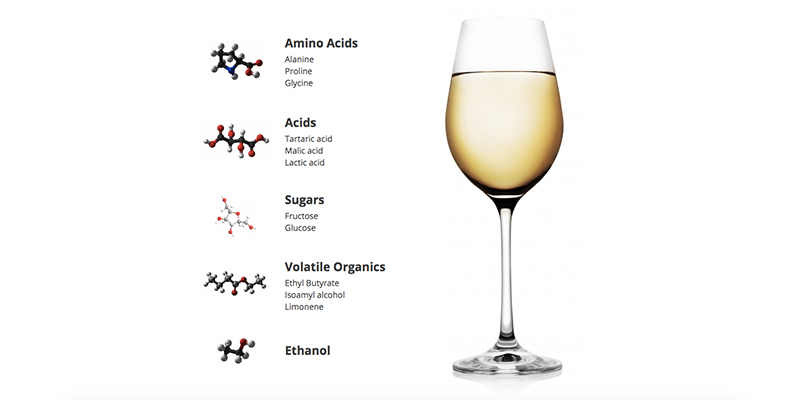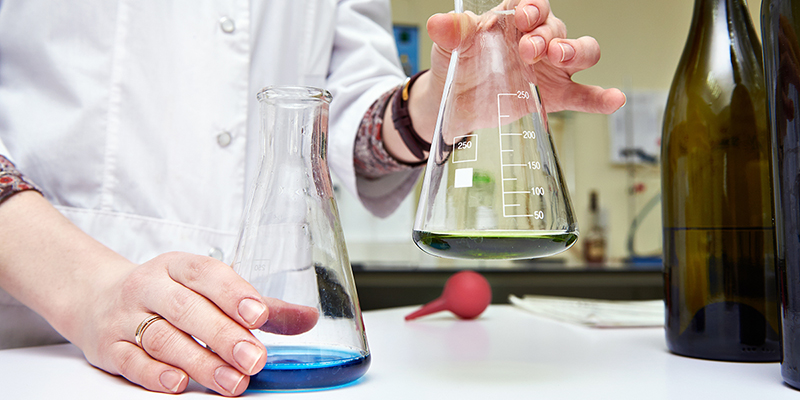If something tastes like wine, smells like wine, but isn’t made from grapes, is it wine?
Ava Winery, a biotech company in San Francisco that (despite the name) doesn’t own any traditional winemaking equipment, says yes. At least, in a chemical composition sense of the word.
“I think the most accurate description (for the final product) will be ‘wine’ because it is chemically identical to wine,” Alec Lee, co-founder of Ava Winery, told VinePair.
Ava Winery’s product is literally chemically identical to wine. Each bottle is a curated mixture of amino acids, acids, sugars, ethanol and organic compounds in water that matches the mixture found in a traditional, grape-based wine. After just a few months of testing and tweaking, Lee and co-founder Mardonn Chua have created a synthetic wine that fools 90 percent of people in blind taste tests, Lee said.
“It was pretty quick to develop a half-decent product,” Lee said. “But the remaining bits of perfection will take an unknown amount of time and work.”

Ava Winery has been able to improve their product so quickly because multiple versions of a wine can be made in a single day. There’s no need for Lee and Chua to ferment or age their wines, even when replicating the taste of a traditionally fermented and aged wine. Once the right mixture is decided on, it only takes a couple minutes to make. If you click over to the Ava Winery website, you’ll see that the wine being replicated now is 1992 Dom Perignon Champagne. It’s the first wine that will be released to the public, and will go to market in six to 12 months, Business Insider reports.
Clearly, Ava Winery isn’t afraid to go big or go home when it comes to challenging the top wines in the world.
“We wanted Champagne to start because it’s fitting of the circumstances where we can celebrate the creation of something truly unique and new,” Lee said.
Lee’s wine making (wine mixing?) confidence comes from testing and experience. Josh Decolongon, a certified sommelier, is on the team, and multiple wine professionals were among the 80 blind taste testers. Ava Winery also submitted a wine to a wine competition in March without ever informing the judges that it was a synthetic wine (Lee won’t disclose which competition because the judges still don’t know). All of the judges believed it was a traditionally made wine.
“The average rating was ‘good’ (middle of the road) but again, that was in March, and the product is substantially better now,” Lee said.
So when will you get a taste? There’s no set commercial sale date yet, but a $2.7 million investment from Horizon Ventures in August has helped the date come sooner rather than later. Lee also admits there isn’t a price yet, but it will be “significantly more cost-effective,” and will use 50 to 100 times less water than traditional wine production.
The image of Lee and Chua in white lab coats mixing up a Frankenstein wine isn’t as romantic as the image of a vintner carefully picking quality grapes off of the vine by hand. But then again, hand harvesting is pretty much bullshit anyway.
“I hope winemaking continues forever,” Lee said. “But the truth is that most commercial wine is not created in this romanticized way and it’s a highly mechanized, commercial operation. The rest of it is just marketing.”
Curious consumers will just have to wait until it’s perfected and on the market to find out for themselves if something that smells and tastes like wine should be considered wine. Until then, keep an eye out for a Judgment of Paris style showing. Or, as Lee suggests it be called, a “Judgment of the Grape.”

